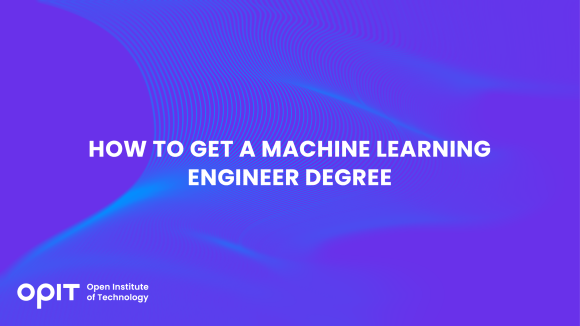

Why study for a machine learning engineer degree?
The simple answer is that the industry is growing explosively. Precedence Research points out that the machine learning market was worth $38.11 billion (approx. €35 billion) in 2022. By 2032, it’ll be worth $771.8 billion (approx. €712 billion). That means the machine learning industry will grow by an average of 35.09% per year between now and 2032.
That growth means one thing:
The industry is going to be looking for people with a machine learning engineer education.
If you pursue a machine learning engineer degree with an accredited institution – such as OPIT – you stand to be at the forefront of one of the fastest-growing industries in the world.
Machine Learning Engineer Education: The Foundation of Your Career
You’ll require a bachelor’s degree in a relevant field – such as computer science, at the very minimum, to start a career in machine learning. However, most roles ask for more. A master’s degree in a field like data science or software engineering will make you a more attractive candidate.
Those requirements also indicate the core subjects you’ll study when working toward a degree for machine learning engineer roles. Math, computer science, statistics, and computer science are all fundamentals that are vital to the industry.
As you move onto the master’s track, you’ll start learning more advanced machine-learning concepts, such as algorithms and data analysis.
Degree for Machine Learning Engineer: Choosing the Right Program
Signing up for the first machine learning engineer bachelor’s degree you find is rarely a wise course of action. You need to weigh your options carefully before choosing a course, with the following factors coming into play:
- Course Content and Curriculum – Look for degrees that include machine learning-specific components – such as feature engineering and model evaluation – ideally with a practical aspect that gives you real-world experience.
- Course Faculty – The “real-world experience” point also applies to your course’s faculty. The best programs are created by those who have experience in the machine learning industry. They understand what employers want to see, as well as the likely applications for the technical knowledge you’ll develop.
- Institution Accreditation – A lack of accreditation hurts the credibility of your machine learning engineer degree. Look for a program that’s accredited by a relevant authority, such as the European Qualifications Framework (EQF).
- The Cost – Master’s degrees in Europe can cost anywhere between €8,000 and €45,000, with the total you’ll pay being a determining factor for which degree you choose. Try to find a balance between the cost and the credibility of the organization offering the degree.
OPIT’s degree programs offer the ideal blend of these factors. They’re affordable – with tuition costing as little as €2,250 per term – and designed by faculty with real-world experience in the machine learning and computer science sector. They’re also accredited by the previously mentioned EQF.
Best Online and Offline Master Programs for Machine Learning Engineering
With the above factors considered, your next choice comes down to location:
Do you study offline or on?
The online course format delivers flexibility, though it means you don’t get to enjoy the on-campus lifestyle. Regardless of which you prefer, the following are the five top machine learning engineer degree courses available in Europe:
OPIT – MSc in Applied Data Science & AI
Beyond excelling in all of the above factors, OPIT’s MSc course offers a mix of live and pre-recorded content to make the online learning experience more interactive. There are no final exams – a relief for students who hate pressure-filled situations – with the course instead focusing on practical assignments with real-world applications.
University of Oxford – MSc in Advanced Computer Science
Offered by one of the U.K.’s leading universities, this MSc takes a broad approach to the AI sector, with machine learning as one of several components. It also covers cybersecurity and the emergence of AI in the medical field. A typical week involves 35 hours of study, eight of which are lectures, with another four covering practical sessions.
University of Cambridge – MPhil in Machine Learning and Machine Intelligence
An 11-month program, this master’s degree covers machine learning, as well as computer vision and robotics, speech and language processing, and how humans interact with computers. Practical exercises also give you a chance to work with Ph.D. students in the machine learning field.
KU Leuven – MSc of Artificial Intelligence
A multidisciplinary program, this master’s degree accepts students with backgrounds in subjects like psychology and economics. As such, it’s a good choice for those who have completed a bachelor’s degree in a non-tech subject and don’t want to restart their education careers. It covers the fundamentals but practically-minded students should beware – the course emphasizes technical knowledge.
Technical University of Munich – Data Engineering and Analytics MSc
Another on-campus degree, TUM’s course covers machine learning, along with key data science techniques such as computer vision and scientific visualization. But the focus is on Big Data – the driving force in everything from machine learning to self-driving vehicles.
The Future of Technology: Machine Learning Applications
You’ve seen the expected industry growth for the machine learning industry, but what about the applications of the knowledge you’ll gain from your machine learning engineer degree?
Simply put – the degree will apply to almost every industry, with a handful of examples including:
- Facial recognition technology development
- Financial fraud detection
- Enhanced analytics for the healthcare sector
- Predictive analytics
- Generative AI programs, such as ChatGPT
Online Education Advantages: Flexibility and Accessibility
Let’s assume you’d like to study to become a machine learning engineer but don’t want the on-campus experience for whatever reason. Are online degrees as valuable as their traditional counterparts?
They are, as long as the program is provided by an accredited institution like OPIT. Plus, studying online provides more flexibility in your learning schedule – giving you autonomy in how you complete your studies – and isn’t as individualistic an experience as it seems. For instance, OPIT schedules live video lectures, offers pre-recorded sessions, and creates opportunities for students to work together on real-world projects.
OPIT’s Master’s and Bachelor’s Programs That Help You Become a Machine Learning Engineer
There’s one more thing left to do:
Choose a machine learning engineer degree. OPIT offers three courses that set you on the path to a career in machine learning.
BSc in Modern Computer Science
Think of this course as a foundational machine learning engineer bachelor’s degree. You’ll combine learning about AI with the fundamentals of computer science – programming, data science, and database management, all included.
MSc in Responsible Artificial Intelligence
For those concerned about the ethical implications of AI, the MSc in Responsible Artificial Intelligence covers the machine learning bases. But it also shows you how to use what you’ve learned ethically to create sustainable AI systems.
MSc in Applied Data Science & AI
A more traditional degree for prospective machine learning engineers, this course builds on the previously mentioned BSc, with a specific focus on overcoming real-world problems using machine learning.
Choose OPIT
With the machine learning sector set for such pronounced growth, earning a specialized degree in the field now could set up your career for decades to come. Trust OPIT to provide that degree – it’s an EQF-approved online institution with exceptional degree programs.
Have questions?
Visit our FAQ page or get in touch with us!
Write us at +39 335 576 0263
Get in touch at hello@opit.com
Talk to one of our Study Advisors
We are international
We can speak in:




